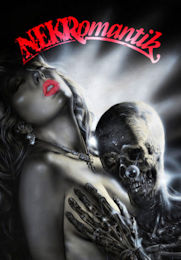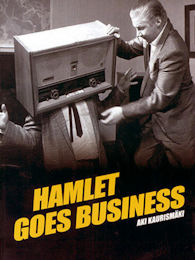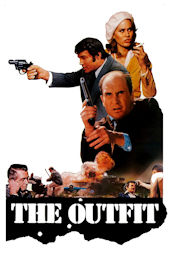
 During the '90s, we went through a long period where many good, well-made independent films were completely overlooked because their posters or - more importantly - their VHS box art and, later, their DVD covers were garbage. Still, we have plenty of classic films with beautiful period movie posters that use some Photoshopped garbage as the cover, instead. But independent films of the past 5 to 10 years have gone hard in the other direction. It's apparently so easy now to find a cheap, creative graphic designer or artist to kick out a great movie poster that even the most low-grade, unwatchable homemade shit is able to fool you into giving it a look. Compared to the other costs associated with making a film, that poster that's going to be seen on any number of streaming sites is worth far more for the money than any actor or cinematographer or set or prop. You can fool people into watching a few minutes of garbage to push up your viewer metrics with a good poster.
During the '90s, we went through a long period where many good, well-made independent films were completely overlooked because their posters or - more importantly - their VHS box art and, later, their DVD covers were garbage. Still, we have plenty of classic films with beautiful period movie posters that use some Photoshopped garbage as the cover, instead. But independent films of the past 5 to 10 years have gone hard in the other direction. It's apparently so easy now to find a cheap, creative graphic designer or artist to kick out a great movie poster that even the most low-grade, unwatchable homemade shit is able to fool you into giving it a look. Compared to the other costs associated with making a film, that poster that's going to be seen on any number of streaming sites is worth far more for the money than any actor or cinematographer or set or prop. You can fool people into watching a few minutes of garbage to push up your viewer metrics with a good poster.
Now, I won't say that 2019's Wolf is complete garbage. It does work hard to try to look better than it actually is. And looking at co-writer/director/actor Stuart Brennan's list of credits gives you the impression that he enjoys making films and is trying to get maximum bang for his minimal buck. But the artistry just isn't quite there.
A quick run-down: Wolf is ostensibly about a group of ten Roman soldiers in ancient Britain, sent out to look for four missing scouts, who were apparently sent to the king of the Picts to make peace. This peace was possible because the Picts were struck with some mysterious illness and Rome thought it would be a good time to talk with them and try to bring them into the fold. The soldiers traipse around the forests and are attacked by some sort of beast or some sort of men or... you know, werewolves. If you are a Neil Marshall fan, you're probably thinking "Oh, so they crammed together Centurion with Dog Soldiers?" and I wouldn't say you're entirely wrong, but it isn't even in the same league as either of those films.
I also won't say that the film is ugly. It often looks better than it probably deserves to and you can tell effort was put into the tone and feel of the movie, even if they couldn't quite get it all the way there. They made every effort they seemingly could to visually appeal to the viewer. Well, perhaps with exception of the camera work. On the more nitpicky end of things, there is an overabundance of drone footage. Drone footage is definitely a great tool for filmmakers these days to amp up a low-budget film with some shots that give it more scope. But, for whatever reason, these are the most drone-footage-y drone shots I've ever seen droned. Something about them completely took me out of the movie. Perhaps it was how often they occur early on and fact that they all feel the same; I would have gladly taken a completely still drone shot from directly overhead for once, but it was always just that overly-fast pan across the wilderness from above. But, like I said, that's one of the smallest problems. The real problem for me was poor camera choices, the overuse of shaky handheld shots, the same boring angles over and over instead of showing any inventiveness in filming scenes, and the repetitive shots (or lack thereof) to give the impression of werewolf attacks, but without showing anything. I think that last point becomes the most annoying: again and again you see the naked torso of some man blurrily run by in front of the camera as the soldiers stand in the background, huddled in a circle with their shields raised. By the end, you're getting dozens and dozens of those moments in the course of a couple of minutes. I wasn't even sure anymore if they actually filmed people running in front of the camera or just had a few FX shots of bodies moving by and composited them in front of shots of the soldiers over and over.
It's easy to see why they'd try to hide the "werewolves", as they are. You know pretty early in the film that they're not going to have the effects to back anything up. You can sense it from the unnecessary opening scene of a boy and his dog being attacked by the "wolf", mostly just being the actor running and repeatedly falling down while very mediocre wolf snarl sounds from some cheap audio library are mixed in too loud over the action. That's another trend that will repeat as the film goes on. When the "werewolves" appear, they all look like (and may actually be) the same guy with sort of lank brownish hair and stubble, with some fake claws and some hand make-up, wearing the fakest-looking plastic "fangs" you've seen since a child's vampire costume, plastic tusks sticking out of his face, lopsided, as he pretends to howl. It's really for the best that they show it as little as possible, but the shots they use to cover it up are... well, one shot. There's one trick to hide the monster and it's a bad one.
On the upside, the makeup effects budget was spent on costumes, which look pretty good. Lots of Roman armor and weapons which, though too shiny and clean, lift the quality of the film early on when you're first introduced to the soldiers. That is, until you start to hear the dialogue and plot and quickly lose your optimism.
Now, I'm not going to say that the acting is bad; most of the cast is good enough for the type of film they're in. They're not the most skilled actors in the world, but they're doing something they enjoy, they're not unbelievable, they're not poorly delivering lines, they're not wooden. At worst, you can accuse them of being boring, as they don't have too much to work with. I honestly couldn't tell most of the male characters apart, which is fine because all the nondescript ones die off quickly, leaving the ones that you can at least differentiate - mostly the writers and their buddies. (Maybe that's a flaw of the screenwriting, as they only made the characters that were going to be there for most of the run... well, characters.) Also, you could perhaps complain about the accents a bit too. But, like I said, they're trying their best, they're getting paid, they're doing what I assume they love, and they don't look too bad doing it.
The real problem here is the writing. The writers act in the film as well (and, as I said, one of them also directed it), so they obviously are passionate about their little low-budget films. There's nothing wrong with churning out some fun, not-necessarily-great movies to make with your friends. But if I have to watch it, I'm going to treat it like every other thing I see. And the script is sloppy. You're told later on that all these men volunteered out of honor, duty, and the goodness of their hearts to track down their missing brethren. And, yet, the opening scenes are spent with them arguing and acting like annoyed pricks who can't believe they're stuck doing the thing they volunteered to do. Also, they don't really act like soldiers, particularly well-trained ones in the Roman army, considered to be one of the best-trained fighting forces in history. I won't delve too much into the historicity of a movie about werewolves or debate whether the multi-ethnic array of Roman soldiers and slaves would be grouped up, as well as mixing genders. But it does seem stupid, on its face, that the Roman soldiers are so dumb, so alternatively cowardly then hellbent on killing themselves and everyone around them to save people that are obviously already lost, so quick to argue and ignore orders from their leader, so obsessed with constant infighting and blame, so incapable of attempting any tactic to defend themselves from attack. Except for standing in a loose circle with their shields pointed outward and waiting to be attacked, they don't show any semblance of military training. When they realize they're being followed and, by nightfall, they'll be attacked again, they don't spend the day finding a good location to stand their ground and fortifying it. They just attempt to run back to Hadrian's Wall as quickly as possible, while being pursued, picked off, and allowing members of the group to wander off without ever stopping to wonder what happened to them with any more interest than "They're on their own now."
It's all a sloppy excuse to have the whole group slowly picked off until the women are left and... they escape, I guess? It implies that they're safe (as there was apparently only two werewolves tracking them) and they'll take knowledge that silver can kill the creatures back to the legions, who will be ready for the eventual confrontation. (I won't even comment on the dumb bullshit ending for poor Ima, ignominiously booted from the movie in its final moments in a confusing manner. The shortest of shrift for her.) It obviously doesn't really work, overall.
While it may have been a fun project for them, it isn't a fun watch for us. It's not good, it's very dumb, the actors can't do much with it (unless what you want them to do is vomit baby food out of their mouth over and over as they begin to "turn into werewolves"), it's poorly-written and compares badly to the things it feels like it lifted ideas from, it's not well-shot, the effects aren't good, the editing needs work... I could go on like this for a while. But, importantly, at least it's short.


 I'm not sure I'd call myself a Terry Gilliam fan. I think I've seen all but two of the films he's directed, but I don't have strong feelings about most of them. I'm somewhere between being indifferent to his work and enjoying his films but mostly forgetting they exist. I don't list him as a beloved filmmaker or think about his movies often. I think the film of his that I've been the most attached to is 12 Monkeys and I'm not sure I've watched that in 20 years. That said, I at least feel well-versed enough with his traits and foibles to compare the experience when watching one of his new films. And I've been putting off The Zero Theorem for about 6 years, so I decided to finally rectify that.
I'm not sure I'd call myself a Terry Gilliam fan. I think I've seen all but two of the films he's directed, but I don't have strong feelings about most of them. I'm somewhere between being indifferent to his work and enjoying his films but mostly forgetting they exist. I don't list him as a beloved filmmaker or think about his movies often. I think the film of his that I've been the most attached to is 12 Monkeys and I'm not sure I've watched that in 20 years. That said, I at least feel well-versed enough with his traits and foibles to compare the experience when watching one of his new films. And I've been putting off The Zero Theorem for about 6 years, so I decided to finally rectify that.
 I think I first heard of Nekromantik in the '90s, mentioned in whispers in the same breath as Salo or any number of other rare and forbidden films. I didn't think much about the film again until I heard director Jörg Buttgereit was doing some sort of effects for Skinny Puppy's live reunion at a festival two decades ago. I was left to wonder what he really had to contribute and what he was really capable of in the first place. I was more interested in watching documentaries about the West German underground scene from the '80s instead of this, but figured it might behoove me to actually see the movie before hearing others talk about or with Buttgereit. It probably wasn't worth the trouble.
I think I first heard of Nekromantik in the '90s, mentioned in whispers in the same breath as Salo or any number of other rare and forbidden films. I didn't think much about the film again until I heard director Jörg Buttgereit was doing some sort of effects for Skinny Puppy's live reunion at a festival two decades ago. I was left to wonder what he really had to contribute and what he was really capable of in the first place. I was more interested in watching documentaries about the West German underground scene from the '80s instead of this, but figured it might behoove me to actually see the movie before hearing others talk about or with Buttgereit. It probably wasn't worth the trouble.

 It probably changes my opinions about this film substantially that I've read the novel "The Outfit", as well as close to a dozen of (Donald E. Westlake as) Richard Stark's other Parker novels. Most people may be familiar with Parker through a few of the other adaptations of Richard Stark's novels. "The Hunter" was adapted into 1967's Point Blank (with Lee Marvin) and 1999's Payback (with Mel Gibson). The Gibson film is the most accurate story-wise, at least in Brian Helgeland's director's cut of the film that was eventually released. Though it's a very modern adaptation, the 2013 Parker at least gets credit for being the only Parker film to not change Parker's name. Also, it does a good job of capturing the feel of the Parker novels, often revolving around Parker committing a well-planned crime of some kind, getting double-crossed, and then seeking revenge to retrieve what he's owed.
It probably changes my opinions about this film substantially that I've read the novel "The Outfit", as well as close to a dozen of (Donald E. Westlake as) Richard Stark's other Parker novels. Most people may be familiar with Parker through a few of the other adaptations of Richard Stark's novels. "The Hunter" was adapted into 1967's Point Blank (with Lee Marvin) and 1999's Payback (with Mel Gibson). The Gibson film is the most accurate story-wise, at least in Brian Helgeland's director's cut of the film that was eventually released. Though it's a very modern adaptation, the 2013 Parker at least gets credit for being the only Parker film to not change Parker's name. Also, it does a good job of capturing the feel of the Parker novels, often revolving around Parker committing a well-planned crime of some kind, getting double-crossed, and then seeking revenge to retrieve what he's owed.